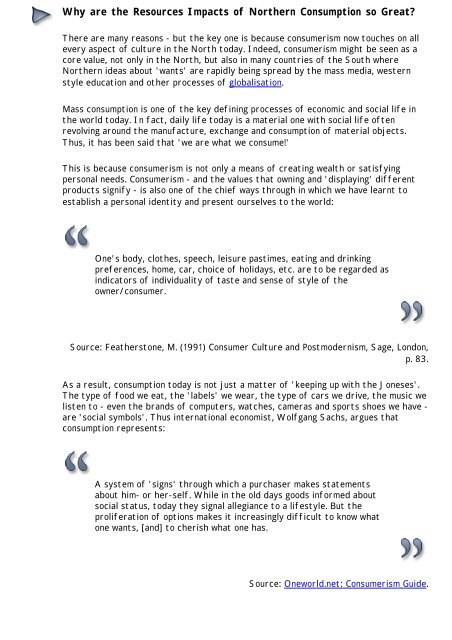Module 9 Consumer education - APCEIU
Module 9 Consumer education - APCEIU
Module 9 Consumer education - APCEIU
You also want an ePaper? Increase the reach of your titles
YUMPU automatically turns print PDFs into web optimized ePapers that Google loves.
Why are the Resources Impacts of Northern Consumption so Great<br />
There are many reasons - but the key one is because consumerism now touches on all<br />
every aspect of culture in the North today. Indeed, consumerism might be seen as a<br />
core value, not only in the North, but also in many countries of the South where<br />
Northern ideas about 'wants' are rapidly being spread by the mass media, western<br />
style <strong>education</strong> and other processes of globalisation.<br />
Mass consumption is one of the key defining processes of economic and social life in<br />
the world today. In fact, daily life today is a material one with social life often<br />
revolving around the manufacture, exchange and consumption of material objects.<br />
Thus, it has been said that 'we are what we consume!'<br />
This is because consumerism is not only a means of creating wealth or satisfying<br />
personal needs. <strong>Consumer</strong>ism - and the values that owning and 'displaying' different<br />
products signify - is also one of the chief ways through in which we have learnt to<br />
establish a personal identity and present ourselves to the world:<br />
One's body, clothes, speech, leisure pastimes, eating and drinking<br />
preferences, home, car, choice of holidays, etc. are to be regarded as<br />
indicators of individuality of taste and sense of style of the<br />
owner/consumer.<br />
Source: Featherstone, M. (1991) <strong>Consumer</strong> Culture and Postmodernism, Sage, London,<br />
p. 83.<br />
As a result, consumption today is not just a matter of 'keeping up with the Joneses'.<br />
The type of food we eat, the 'labels' we wear, the type of cars we drive, the music we<br />
listen to - even the brands of computers, watches, cameras and sports shoes we have -<br />
are 'social symbols'. Thus international economist, Wolfgang Sachs, argues that<br />
consumption represents:<br />
A system of 'signs' through which a purchaser makes statements<br />
about him- or her-self. While in the old days goods informed about<br />
social status, today they signal allegiance to a lifestyle. But the<br />
proliferation of options makes it increasingly difficult to know what<br />
one wants, [and] to cherish what one has.<br />
Source: Oneworld.net: <strong>Consumer</strong>ism Guide.








